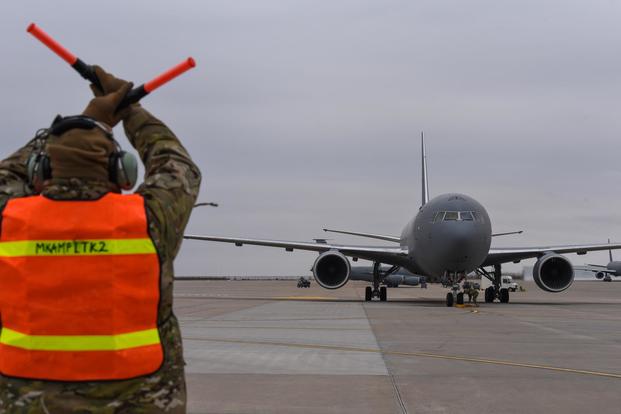The U.S. Air Force's troubled new refueling tanker has yet another problem: excessive fuel leaks.
In a statement released Monday, the Air Force said the problem in the KC-46 Pegasus has been upgraded to a "Category 1" deficiency, defined as a critical flaw that impacts the development, schedule and, potentially, safety of the aircraft.
"The Air Force and Boeing are working together to determine the root cause and implement corrective actions," said spokeswoman Capt. Cara Bousie. "The KC-46 Program Office continues to monitor the entire KC-46 fleet and is enhancing acceptance testing of the fuel system to identify potential leaks at the factory, where they can be repaired prior to delivery."
The service said the program office first identified the fuel-leak issue during an air refueling test in July 2019, but did not disclose when the issue was reclassified as a higher-grade defect.
Related: Air Force's Troubled Tanker Is Years Away from Use -- Unless It's Needed to Fight
Leaks were discovered in 16 aircraft, according to Boeing.
"Boeing has already completed repairs on 7 of the 16 [aircraft]," the company said in a statement. "We are disappointed to learn of this development and are already implementing assembly and installation improvements to correct the issue. We will continue to implement repairs as needed."
According to the company, the aircraft's fuel system is enabled with an extra protective measure for fuel containment.
"In some cases with this issue, aircraft maintenance crews are finding fuel between the primary and secondary fuel protection barriers within the system," Boeing said. Per the service's contract, the manufacturer is financially responsible to fix the issue "at no additional cost to the government."
The news comes as the aerospace company suspended production of its commercial and military-derivative aircraft operations in the Puget Sound region in Washington state -- including the KC-46 tanker -- amid the novel coronavirus pandemic.
"We're actively engaged with our defense customers to minimize any impacts on their missions," Boeing said March 23, when it announced the halt in production, anticipated to last for 14 days.
The KC-46 has had many problems, including issues with how the boom connects and disconnects from specific aircraft; foreign object debris (FOD), such as trash, tools, nuts and bolts, found scattered inside multiple planes; a recently rectified problem with faulty cargo locks; and a glitch in its Remote Vision System (RVS) software.
Boing said some work will continue during the shutdown to fix the RVS, a critical capability that permits the in-flight operator to view the refueling system below the aircraft.
The tanker's expected readiness has been pushed back at least to the 2023-2024 timeframe because of the RVS glitch, which doesn't allow a clear, aligned visual of the boom connecting to another aircraft.
Despite that issue, the Air Force accepted its 31st tanker earlier this month.
-- Oriana Pawlyk can be reached at oriana.pawlyk@military.com. Follow her on Twitter at @Oriana0214.
Read More: 1st US Service Member Dies of Coronavirus












